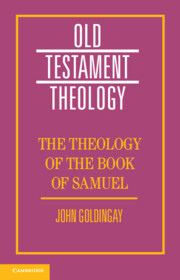Refine search
Actions for selected content:
3 results
Chapter 7 - Yahweh Who Watches a King (2 Samuel 11:1–24:25)
-
- Book:
- The Theology of the Book of Samuel
- Published online:
- 08 May 2024
- Print publication:
- 09 May 2024, pp 178-213
-
- Chapter
- Export citation

The Theology of the Book of Samuel
-
- Published online:
- 08 May 2024
- Print publication:
- 09 May 2024
9 - Rahab’s Courage and the Gibeonites’ Cowardice
- from Part III - Rahab: An Archetypal Outsider
-
- Book:
- War, Memory, and National Identity in the Hebrew Bible
- Published online:
- 27 July 2020
- Print publication:
- 23 July 2020, pp 148-166
-
- Chapter
-
- You have access
- Open access
- HTML
- Export citation
